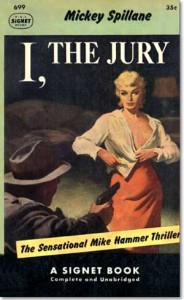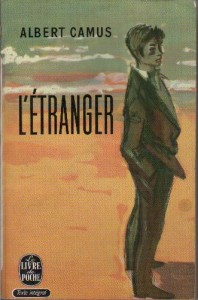Tuesday, July 15: High-Heeled Gumshoe
LURID
by Melodie Johnson Howe
Larry McMurtry opined in the Los Angeles Times on July 5 on the dust jacket of Mickey Spillane’s novel, I, The Jury:
“McMurtry analyzes the cover of I, the Jury, the crime writer’s 1947 pulp novel, with the zeal of an anthropologist exploring a lost culture: In the gritty paperback’s original illustration, a knockout blond is peeling off her clothes. She’s trying to seduce hard-boiled detective Mike Hammer. But he doesn’t buy it and plugs the dame with hot lead. ‘The famous cover of that “real blonde” in a sense pointed the way to the vast loosening of sexual morals that occurred in America and Western Europe in the 1960s,’ McMurtry suggests.”
When I read this I thought of those people saying that Elvis was the end of all good taste, and locking up their teenage daughters at the same time. And then came the Beatles. Mop heads. Look how quickly I went from McMurtry to rock’n’roll. Youth and their music left books in their dust. (And it’s all Spillane’s fault.) The article continues:
“Elsewhere, he criticizes the ambitious Library of America project, which enshrines classic works of U.S. fiction and nonfiction in special black-jacketed editions: ‘At least half of the books they republish seem to me wholly unreadable, with a few being merely second rate,’ McMurtry says. ‘The more of our minor fiction they publish, the more they weaken the national brew.’”
I assume McMurtry is in a snit over the wonderful Library of America editions of Crime Novels: American Noir of the 1930s, 1940s and the 1950s. I highly recommend these collections even if they “weaken the national brew.”
 But back to Spillane. I don’t know what McMurtry is talking about. The dust jacket compared to the pulp fiction covers of the forties seems tame. A woman opening the top of her dress (very little cleavage exposed) while Hammer holds a gun on her. Unlike the reporter of the article, you can view this cover two ways. Hammer is using his gun to force her to undo her bodice or she is taking off her clothes by choice. Maybe, despite the gun aimed at her, she has the control. Seduction is more powerful and therefore more deadly. Has McMurtry gone all PC on us? Did Brokeback Mountain turn him into a wuss? He wrote a lovely novel called Leaving Cheyenne about a woman who loves two men. And, if I remember correctly, she never makes a choice between them. (How dare he! Where is his morality?) Did Spillane’s dust jacket cause him write such a book?
But back to Spillane. I don’t know what McMurtry is talking about. The dust jacket compared to the pulp fiction covers of the forties seems tame. A woman opening the top of her dress (very little cleavage exposed) while Hammer holds a gun on her. Unlike the reporter of the article, you can view this cover two ways. Hammer is using his gun to force her to undo her bodice or she is taking off her clothes by choice. Maybe, despite the gun aimed at her, she has the control. Seduction is more powerful and therefore more deadly. Has McMurtry gone all PC on us? Did Brokeback Mountain turn him into a wuss? He wrote a lovely novel called Leaving Cheyenne about a woman who loves two men. And, if I remember correctly, she never makes a choice between them. (How dare he! Where is his morality?) Did Spillane’s dust jacket cause him write such a book?
 McMurtry is a romantic writer. Spillane is a pugilistic writer. But while McMurtry’s characters feel a sense of loss, place, time, and love, Spillane captured the loss of the shared values of men and women after WWII. He did this in his usual blunt force style, if you can even call it a style. I’m trying to keep myself from using the word existential. It is such an “arty” word to use when talking about Spillane. I think it would be fun if someone did a comparison between Camus’s The Stranger and I, The Jury.
McMurtry is a romantic writer. Spillane is a pugilistic writer. But while McMurtry’s characters feel a sense of loss, place, time, and love, Spillane captured the loss of the shared values of men and women after WWII. He did this in his usual blunt force style, if you can even call it a style. I’m trying to keep myself from using the word existential. It is such an “arty” word to use when talking about Spillane. I think it would be fun if someone did a comparison between Camus’s The Stranger and I, The Jury.
Camus’s opening line is, “My mother died today.” And the last line in Spillane’s book is when Hammer is asked how he could kill the blonde. Hammer says, “It was easy.” What could be more existential?
But I have wandered off point. McMurtry wasn’t talking about the content of the book but its dust jacket. The illustration. I wish the interviewer had asked him more questions about this, but he went off on some other tangent. I can’t think of any reason to back McMurtry’s observation. This cover was perfect for Spillane. It captured his character Hammer, and his writing. It tantalized his audience. (Cover your eyes. Oh, my God, we’re all going to hell in a hand basket.) All those great lurid pulp covers seduced the reader into their noir world. Today dust jackets are drab things. Yes they are shiny and embossed and so what? They are beyond safe. Does that mean the writing is morally better? I don’t think so.
I admire Janet Hutchings for keeping these old lurid Technicolor covers alive by putting them on the Ellery Queen Mystery Magazines. And I know she has taken some heat for this. Again PC raises its prim nose and sharp chin. But she is keeping alive a tradition of boldness, humor, and sexual fantasy. I particularly got a laugh out of one cover for EQM of an evil woman, in a very low-cut dress —ironing! How can you not admire these sly illustrations? What are we afraid of? What is McMurtry thinking? And what “national brew” is he drinking?
I grew up in Los Angeles, a very lurid place. And I realized one day driving down Sunset Boulevard with the sun in my eyes, that we have very lurid sunsets. Those blood red, sexy flesh-pink, neon orange colors were the same as the ones used on the pulp covers. Even the palm trees look dangerous against such a sky.





















From my childhood, I vividly remember the cover of a dime novel, probably one of my aunt’s. In photographic detail, the focus of the eye showed a room with a man standing across the carpet in front a desk. Nearer the viewer and to the left a woman stood with her back to us. It took a moment to realize the woman had nothing on her lower half, and therefore the man across the room was getting the full view treatment. I know the aesthetic theories of drawing the eye, but that was an amazing artistic trick.
Janet Hutching and her art director are playful, too. Catch the visual pun on the cover of the March/April 2008 issue. My mailing label covers up a ‘clue’ to the pun, but you don’t really need it to get the joke.
Brokeback Mountain can’t turn anyone into a wuss.
There are plenty of gutsy gay men and women.
Promoting stereotypes and hatred against gay people is a rotten thing to do!
This article complains about PC – but it is the one spreading lies about a minority group.
Time for a reality check – bigotry is just plain rotten.
This article was not about bigotry but a well explained difference between two authors. Brokeback Mountain was a love story of star-crossed lovers who happened to be gay. Ms. High Heel pointed out a “romanticist and a pugilist.” The romanticist had little knowledge of the others style….or just plain didn’t like it. Poor Mickey can’t reply. This was an opinion piece it seemed to me, of curiosity in the differences.
As for stereotype and hatred, I’ve seen none of that on this board, period about any group or person.
These men and women are very accepting and that is the reality check.
Way to go Alisa!!! I wholeheartedly agree with you, even though I have a non-writers POV.
I do not believe that Melodie was making a disparaging remark about gay men. She was making a disparaging remark about Larry McMurtry. Personally, I found Brokeback Mountain melodramatic in its overt sentimentality, and, in a certain sense, think it was itself disrespectful of gay relationships by emphasizing gay victimization. In any case, McMurtry’s tear-jerking treatment of Anne Proulx’s source material is a far cry from the cartoonish melodrama of Mickey Spillane, where sensitivity is utterly out of place and sentiment comes in .45 ACP cartridges.
As for her personal convictions, Melodie has earlier written on this site of her intense admiration for W. Somerset Maugham, a gay man and a sensitive author, so I don’t think you should read too much into her comments about Larry McMurtry, who she believed was being pompous and needed to be brought down a peg.
Mike,
My intention was not to insult gay men or gay women. And I know I didn’t “spread lies.”
I too could find insult in these pulp illustrations. They dehumanize women. Turn them into sexual objects. You know the drill. But whatever the intention of the illustrator I love these covers. And I don’t think they are responsible for the downfall of our culture as McMurtry does.
McMurtry can be a sappy romantic. And I think his version of Proulx’s wonderful story shows that. That is why I used the word wuss. It was, if a little off-handed, a critical judgement of McMurtry not an anti gay judgement.
I would love to have a discussion about this but, please, no name calling.
Wow, James and alisa. Your well-considered remarks came from two different directions, but articulated better than I could have.
Mike, I had to go back and reread that part about Brokeback, but I don’t get an impression of prejudice. Besides, I’m supposed to be the insensitive smartass, not Melodie! Anyway, welcome to the family. There’s more than one place at the table.
I agree that before today, I’ve never seen any prejudice on “Criminal Brief” against minorities.
The “national discussion” on Brokeback Mountain has frequently been conducted without anesthesia. I was at a dinner party in 2006, when another guest brought up the movie out of the blue. After discussing her opinion that the film should be boycotted, she turned to me (who had been politely silent on the whole discussion) and demanded whether I had in fact gone to see the film. When I quietly admitted that I had indeed gone to see it, she publicly branded me as an evil person, who was damaging our country. Other people spoke up, and said it should not be allowed in theaters. It was quite a fun evening. I was the only person at the party who had in fact seen the film, and everyone seemed to agree that I was fit for public denunciation, merely for having bought a ticket.
Everyone made it clear that they really, really hated gay people, too.
This is the context in which most discussions of Brokeback Mountain take place. It is a highly polarizing topic.
I have seen the movie as well and while I agree that it was a rather poor adaptation of the author’s rendition, I certainly can stand my ground with someone who treated me like your dinner partners! In fact a rather funny story, my own husband asked what I’d do if he were picketing the movie while I was paying for my ticket. I told him I’d wave at him and say “Hi, honey! See you after the movie!” I have to add that he is not a gay basher or hater, he was just posing a question because we do not, have not, nor ever will have the same view of “what movie to see” he was just testing the waters!
I’d pick new dinner partners were I you and please please wear your bow-tie correctly!
I see a lot of what you do as well, I think most of us do. It is up to (people like) us to set them straight—right, Mike? What time’s the next dinner?
>It is up to (people like) us to set them straight—
Uh, alisa, what do you mean by that? (Okay, I said I’m a smartass.)
>The “national discussion” on Brokeback Mountain has frequently been conducted without anesthesia.
(chuckling) Clever.
It is up to (people like) us to set them straight—
Uh, alisa, what do you mean by that? (Okay, I said I’m a smartass.)……
okay you made me laugh and you are a smartass!
Hey, thanks everybody for all the great replies, including Mike’s. But, Mike, even today you did not encounter prejudice against minortities on this blog.
McMurtry happens to be an avid reader of mystery novels, both classic and contemporary. He reads them for entertainment, sometimes more than once. If you’ve heard him speak in person, you would know this. Also, you might know to read his statement regarding “…the vast loosening of sexual morals…” as tongue-in-cheek sarcasm. The “opining” was taken from his new book, BOOKS: A MEMOIR. Read it; you’ll soon find out that he’s hardly a prig. He talks about his vast personal collection of Italian and European comics, many of which are illustrated with far more “lurid” covers than Spillane’s. And he loves Los Angeles. He recently was awarded a Lifetime Achievement Award by the L.A. Library Foundation, and in his acceptance speech spoke about how much he has always loved Los Angeles, particularly Hollywood Boulevard, where there was once over a hundred second-hand bookstores. As for Brokeback Mountain–the responsibility for any slide into perceived romanticism or sentimentality in that film sits with Ang Lee.
P.S. At a Q & A the morning after the L.A. Library Foundation event, McMurtry was interviewed by a Western historian for a group of about 200 attendees. After listening to his responses to both the historian and the audience, “romantic” is not an adjective that anyone would apply to McMurtry. When questioned about his novel LONESOME DOVE, for example, he said he had written it as an anti-mythic work, a realistic story about the West, its inhabitants, and their hardscrabble lives. He wrote it, he went on, in order to dispel Western myths. But he said he believes that Americans want to believe in the romantic West so relentlessly that they embraced it as reinforcing the myth, rather than as a realistic novel. It was an incredibly enlightening hour and a half.
Hey Mike, where are you coming from? You totally missed the boat on this one. I’ve known “Miss High Heeled” for more than 50 years and I can say with all my heart that she is in no way a bigot. I think you owe her an apology. Melodie is a mystery writer and observer of mankind. She has a real appreciation of the differences in all human beings and could never be accused of spreading “lies”. She may be witty and clever, but she is also very sincere in her observations. Listen to what she is saying and stop reading your own agenda into her comments.
… “romantic” is not an adjective that anyone would apply to McMurtry.
I don’t see how anyone can write this of the writer who gave us “The Last Picture Show” and keep a straight face.
I think Lonesome Dove was romanticised both written and in video. If one wants video adaption of the real west without exception, try Unforgiven. Mr. Eastwood as a director had only that in mind. showing the unforgiven part of “the west”—I think McMurtry may think that’s what people want and that’s what he gave them! Just like in Brokeback, it was written as a love story. The original story really wasn’t as “pretty” but the movie, and this is my opinion only, had to be romanticized to get an audience because of the obvious outcry from such as Mike’s dinner partner. It’s really a catch-22 and I think McMurtry has a big head. Again, my opinion. Because in truth, what McMurtry said was HIS opinion!
I just don’t get the respect OR money he does.
“Judging a book by its cover” is a phrase I’ve heard, but I’ve never heard of a book cover being reviewed! The U.S. first edition paperbacks of J.R.R. Tolkein’s books apparantly had someone who could pass for a Bond Girl on the cover.